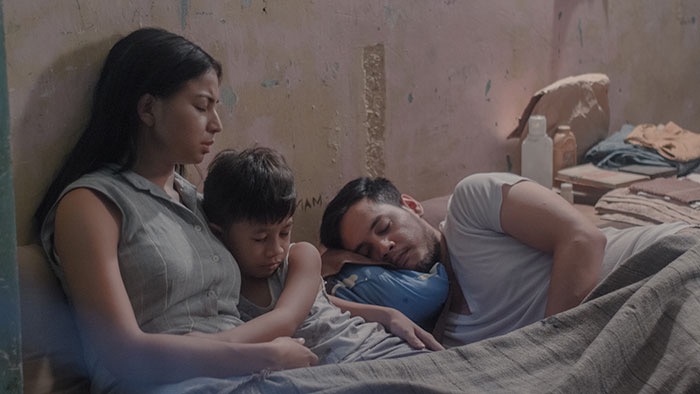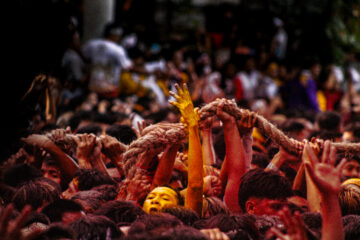
IN A confined arena of outlaws and insurgents, children are living under imperceptible chains of suppression that inhibit their freedom to prosper and taint the purity of their youth. Governed by their naivety, the children are indifferent to the reality of living inside a world of transgressions. However, through the steadfast love of a strong-willed mother, they survive each day with hope and faith that someday, evil will be vanquished.
Kip Oebanda’s entry for this year’s Cinemalaya, Liway,’is a profound personal film set in the Marcos era. It reveals the experiences of a 7-year-old boy named Dakip (Kenken Nuyad) and his parents, Inday (Glaiza de Castro) and Ricardo (Dominic Roco) who are detained at Camp Delgado, an improvised prison made for rebels and criminals. Inside the prison, Inday does her best to keep her son free from trauma by telling him stories about an enchantress named Liway who became the heroine of power, and by singing him songs to slumber to.
However, at the end of the martial law era, hostile memories of Inday’s past haunt her persistently until present day, leaving her with no choice but to tell Dakip of her and Ricardo’s stories as detained protestors, or as Commander Liway and Commander Toto of the New People’s Army in the Visayas.
Liway is a standout film from the plethora of martial law movies that often depict the era through bloody and gruesome scenes. Instead of the common visuals, the film uses subdued and nonviolent portrayal of events—a technique where emotions are captured through cordial narration without compromising portrayals—which are bracing and compelling for those who have been dulled by the affright of previous martial law films.
During the first few scenes, Liway’s concrete narrative is elusive. But with Dakip’s exhibition of charm and innocence, this minor flaw becomes almost insignificant. With the child actor’s impressive performance, no audience can resist his delivery of humor and wit.
As the film progresses, it starts to delve deeper into the horrific situation of the family inside the prison. The film highlights Dakip’s unfortunate life as a child who was born inside a prison. Dakip’s living conditions forfeit his right to live normally outside the walls of a cruel camp. This is made evident when he was brought outside and he waited for a mannequin to respond to him verbally. Dakip’s wretched experiences and his cluelessness about the outside world are part of an unexposed reality of martial law’s brutality.
Aside from Dakip’s life inside the prison, succeeding scenes cater to a more serious discourse on the gruesome truth about how democracy was achieved: through the deaths of countless people who fought against the injustices of martial law.
Liway’s compelling storyline is a product of the director’s heartfelt and personal touch to the story. Enforced by the masterful work of Oebanda’s co-writer, Zig Dulay, the film became even more comprehensible and palatable for wider audiences. Overall, this film showed how humane rebels are and how these people are often denigrated by the government and mass media. The combined effort of Oebanda and Dulay may draw out sympathy from the viewers as they put themselves in the shoes of communist insurgents.
“[Hindi] naman magtatagal ang kadiliman. Balang araw, mawawala din ang halimaw sa ating lugar. (The darkness will not last forever. One day, the monster in our midst will vanish).”
This line of Commander Liway is a reflection of her strong belief that despite all the injustices and mayhem inflicted upon the country, hope will never falter. This is how the young mother preserves her son’s hope amid the harsh realities inside Camp Delgado.
In these trying times where havoc and oppression are rife, Liway is a weapon of enlightenment to fight against and clarify the errors written in the juncture of history. Liway is a film that upholds the undying hope of Filipinos and serves as a potent reminder that we have won many battles before; we can emerge victorious again. F



